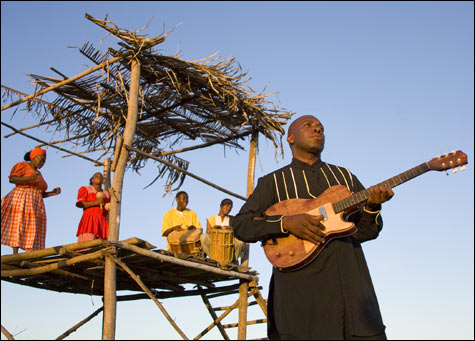
FALLEN STAR: The Garifuna musicians whom Palacio helped put on the musical map are touring in his memory. |
Last year was an important one for the Garifuna musicians of Central America. The Garifuna, descendants of African slaves who were shipwrecked in the island of St. Vincent in 1635 and intermarried with Arawak and Carib Indians, are today a marginalized group struggling to preserve their cultural identity. Their fortunes seemed to rise when Andy Palacio of Belize scored an international hit with the album Watina (Cumbancha), an inspired blend of folkloric roots and smart, organic production. Palacio and the Garifuna Collective toured the world most of last year promoting that album (they did a show at the MFA), and they were getting ready to hit the road again when the 47-year-old Palacio died from a massive stroke in January. The Collective regrouped, and the tour — now a memorial to a fallen star — is on, with a stop at Johnny D’s this Saturday.
“Andy had been waiting most of his life for this moment,” says producer Ivan Duran from his studio in Belize. He’s holding two new music magazines and the new Belize Telephone Directory, all with Palacio’s picture on their covers. “Andy was supposed to be enjoying all this stuff right now.” Duran has been producing Garifuna music for more than a decade, and he deserves as much credit as anyone for the genre’s current cachet. He recruited three generations of musicians from Belize and Honduras to create the Garifuna Collective, and under his direction they created Watina.
The band’s current tour promises more than wistful nostalgia. Duran and his musicians have just released a sister CD to Watina; Umalali: The Garifuna Women’s Project (Cumbancha) is a rich collection of recordings Duran has been collecting and producing as soulful roots pop. Umalali goes back to Duran’s early days of recording Garifuna music. “I was working with all these female backing vocalists, and I realized that they knew more songs than all the men together. You would ask them to sing a song and they could go on for hours without repeating a single melody. Women have been the bearers of a lot of the musical traditions.”
But the women were not professional musicians, and Duran worked meticulously to fashion pop music from folklore. Silvia Blanco’s “Fuleisei (Favours)” comes out with a racing, flamenco feel, and her “Barübnaa Yagian (Take Me Away)” is jaunty, guitar Afropop. Silvia’s 54-year-old mother, Sofia Blanco, gives her robust voice to a mournful tale of a difficult childbirth on “Yüdünya Weyu (The Sun Has Set),” which is produced as, yes, buoyant paranda party music. Elodia Nolberto’s “Tuguchili Elia (Elia’s Father),” an open letter to a traveling husband, chugs along with the funky, chippy-chop guitar of Garifuna punta rock. “Anaha Ya (Here I Am)” is the lament of a woman facing rumors she has sold her daughter into prostitution. Chila Torres sings an earthy, trenchant lead while guitarist Eduardo “Guayo” Cedeño lays on blues-tinged cross rhythms and traditional Garifuna drums crack out quasi-military beats.